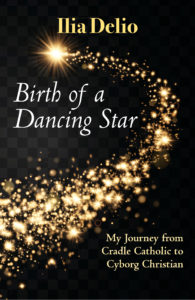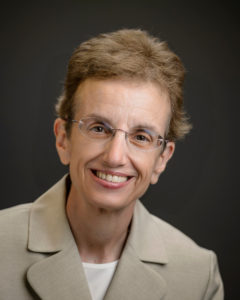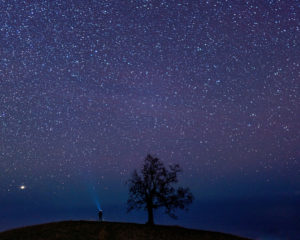Orbis Books, 2019
Review by Laura Locke
I first encountered Sr. Ilia Delio, a Franciscan Sister of Washington DC and bestselling author, when I attended an event a number of years ago at which she was speaking. I was fascinated not only by her obvious intelligence, but also by the creative way that she weaved stories together and made unusual, insightful connections. I was also impressed by the way she held the entire audience enthralled throughout the evening … and left them wanting more.
Sr. Ilia has a Ph.D in Pharmacology from Rutgers University–New Jersey Medical School. Her early adult life, after grad school, was spent working in the fields of neuroscience and neurotoxicology, as one of only a handful of women doing this type of research in those years. She later earned a Ph.D in Historical Theology from Fordham University, and went on to spend many decades teaching, speaking, and writing about science and religion. She currently holds the Josephine C. Connelly Endowed Chair in Theology at Villanova University in Pennsylvania.
I’ve read and enjoyed a number of her books (she has written twenty, and has received numerous literary awards). Two stand-out favourites for me have been The Humility of God: A Franciscan Perspective (Franciscan Media, 2005) and The Unbearable Wholeness of Being: God, Evolution and the Power of Love (Orbis Books, 2013). These books draw upon the lives of two great sources of inspiration for Sr. Ilia: Bonaventure, the 13th century Franciscan saint, and Pierre Teilhard de Chardin, the Jesuit priest and paleontologist who died in 1955. After being introduced to them through Sr. Ilia’s writings, they have become inspirations for me as well. In 2016, she founded the Omega Center (now called the Center for Christogenesis) whose mission is to deepen Chardin’s integration of science and spirituality, through articles, webinars, small groups, an online magazine and annual conferences.
As an admirer of her books, I’ve always wanted to know more about Sr. Ilia – so you can imagine my joy in recently discovering that she has written a memoir called Birth of a Dancing Star: My Journey from Cradle Catholic To Cyborg Christian (Orbis Books, 2019).
– so you can imagine my joy in recently discovering that she has written a memoir called Birth of a Dancing Star: My Journey from Cradle Catholic To Cyborg Christian (Orbis Books, 2019).
The book is a delightful page-turner, as we journey through her life. Born Denise Delio in 1955 in Lyndhurst, New Jersey into a family of Italian and Catholic heritage, she was the youngest of four children. Her father, born in Brooklyn, NY, was reserved and gentle with a great sense of humour – while her mother, a native of Sicily, was strong-willed, stylish and intellectual. Young Denise attended a Franciscan grammar school and was a gifted student, especially in math, though she suffered from a mild form of dyslexia and had a poor sense of spatial relationships. She also writes of having a sense of divine mystery very early in life, and recalls telling a teacher in grade three that she wanted to become a nun. As a young child, she writes that she was “happy just to sit and talk to God; solitude was my delight.”1 But she also enjoyed music (playing the piano and later guitar), wrote poetry, and loved sports. She was always tall for her age, and dreamt of becoming famous one day. When Denise and her parents moved to Fairfield, New Jersey just as she was beginning middle school, she had trouble making new friends, as most of the other students had grown up together. She writes with poignancy about trying to “fit in” with a group of girls who turned out to be mean-spirited bullies, and how after that stressful experience she felt “loneliness settle in like a blanket”.
Her parents grew concerned and approached her about the idea of attending an all-girls boarding school about an hour from their home. St. Mary’s Villa Academy was run by the Sister Servants of Mary Immaculate, a Ukrainian Byzantine Rite order of nuns. Her parents never realized that the school followed the Byzantine liturgical rites of the Eastern Catholic tradition until much later, but young Denise felt instantly at home there. She made a number of friends, especially a girl named Vicky, and together they became “rule testers” – always crossing boundaries, pulling pranks and generally getting into trouble – which she writes about with great zest. However, despite being almost expelled at one point, Denise always got top marks. As well, she found herself more and more drawn inwardly to God, which culminated in one particularly traumatic episode at school involving a fire, during which she had a striking personal revelation. From that moment on, she writes, she knew that she “belonged entirely to God.”2 Thus begins the wild tale of a life of adventure, struggle, and ongoing transformation; times of great turmoil and darkness, and times of stepping into the light.
Sr. Ilia writes with a keen and refreshing honesty about events in the years that follow, and of her quest to find balance and harmony in life. We learn more about her great satisfaction in her work as a scientist, her deep, fiery love for God, her love affairs and missteps, her joy at becoming a nun, her life-changing discovery of the writings of Thomas Merton, and her somewhat rocky search for a religious community in which to live and thrive. When, at one point, she regrets her decision to enter a monastery, she writes, “This was my first real lesson in how God is completely unpredictable, and perfectly at home in chaos. God gives us the freedom to shape our lives, and the most authentic life can only be found in the freedom of letting go, over and over again. Only in this way can God’s love grow.”3
We follow her through time spent living in a number of religious communities, and learn firsthand about the joys, difficulties, and qualms that she experiences. She professed her first vows as a Franciscan servant in 1991, offering her life to follow the path of St. Francis of Assisi. However, by this time a number of religious communities began to face financial insecurity and other pressing problems due to dwindling numbers.
For some time, Sr. Ilia had been considering the idea of starting a new Franciscan community. In 2006, with timely help from both friends and strangers, her idea came to fruition when the Franciscan Sisters of Washington DC was founded. She writes:
We opted to be a noncanonical community and thus not bound by the canonical evangelical counsels of poverty, chastity, and obedience. Instead we revised the vows according to our way of life: poverty as interdependence, chastity as single-heartedness, and obedience as attentive listening. Our new community adventure was extremely risky and daring because we had so few resources to rely on, but a lot of trust in God. Rather than thinking in terms of success or failure, I thought in terms of evolution; we were letting go to engage a new structure of relationship in order to participate in the emergence of Christ.4
The final three chapters in the book are a fascinating exploration of new and rising technologies, such as artificial intelligence and human/cyborg augmentations, which have the potential to destabilize our understanding of nature, culture, and what it means to be human. Sr. Ilia also writes in these chapters about love and hope and the new generation of young people, with their emphasis on “authenticity, transparency and community.”5 As she reflects on some of the pitfalls of so much time online for the ‘internet generation’, such as a loss of self-knowledge and self-reflection, she also sees that young people today are wired for a more unified planet, driven by an inner sense of “belonging to a whole.”6
I love the depth of Sr. Ilia’s thinking, and how she takes me intellectually and emotionally to ideas I would never have visited on my own. She goes beyond the usual dialogue about science and religion, and instead shows us a captivating integration of these disciplines. Along with Teilhard de Chardin, she has come to believe that the principal energy in the universe – indeed the physical structure of the universe – is love. In sharing her life story, she reminds us of the importance of taking what Dag Hammarskjold called “the longest journey – the journey inward.” Her book reveals the fruit of having the courage to set off on this journey.
I’ll end with a quote from Sr. Ilia – an example of her rich and beautiful writing, which often stopped me in my tracks to think over and re-read:
If you want to know how science and religion are related, first come to know the deepest truth of yourself. This is what I realized when I looked into the nighttime sky: I saw myself in the stars and the stars within me.7
- Birth of a Dancing Star: My Journey from Cradle Catholic to Cyborg Christian, by Ilia Delio (Orbis Books, 2019) p. 9
- Ibid, p. 29
- Ibid, p. 85
- Ibid, p. 160
- Ibid, p. 190
- Ibid, p. 191
- Ibid, p. 205
Images of Sr. Ilia Delio and Birth of a Dancing Star book cover courtesy of Orbis Books.









